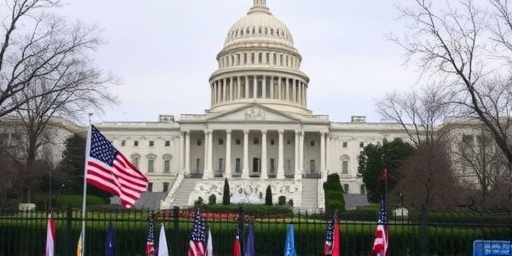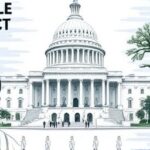Washington, D.C. – With just weeks remaining before a critical deadline, Congress is gridlocked over the fate of enhanced subsidies under the Affordable Care Act (ACA), leaving millions of Americans on the brink of skyrocketing health insurance premiums. These temporary boosts, introduced during the COVID-19 pandemic via the American Rescue Plan Act of 2021, are set to expire on December 31, 2024, potentially uninsured rates to surge and undoing years of progress in health policy.
- Enhanced Subsidies Revolutionized ACA Enrollment – Now on Chopping Block
- Republican Lawmakers Demand ACA Overhaul Amid Fiscal Concerns
- Democrats Rally to Preserve Obamacare’s Lifeline for Families
- Premium Shockwaves Predicted: States Most Vulnerable Exposed
- Bipartisan Breakthrough Attempts Gain Momentum as Deadline Nears
The impasse highlights deep partisan divides, as Republicans demand fiscal reforms and spending cuts while Democrats insist on permanent extension to safeguard low- and middle-income families. Healthcare advocates warn that without action, average premiums could double for enrollees, affecting an estimated 13 million people who rely on these subsidies through HealthCare.gov marketplaces.
Enhanced Subsidies Revolutionized ACA Enrollment – Now on Chopping Block
Since their inception, the enhanced Affordable Care Act subsidies have been a game-changer in health insurance accessibility. Originally temporary measures to counter pandemic-induced economic fallout, they capped premium contributions at 8.5% of household income for a benchmark plan, regardless of income level up to 400% of the federal poverty line – and extended aid beyond that threshold.
Enrollment data from the Centers for Medicare & Medicaid Services (CMS) paints a stark picture: ACA marketplace sign-ups hit a record 21.3 million for 2024, up 28% from pre-enhancement levels. ‘These subsidies didn’t just lower costs; they saved lives by bringing uninsured Americans into the system,’ said Dr. Sara Collins, vice president at the Commonwealth Fund, a health policy research nonprofit.
Without extension, the Congressional Budget Office (CBO) projects that 4 million people could lose coverage entirely by 2026, with another 9 million facing average annual premium hikes of $705. Low-income families in states like Texas, Florida, and Georgia – where Medicaid expansion remains absent – stand to suffer most, exacerbating regional disparities in health policy outcomes.
- Key Subsidy Impacts: Eliminated the ‘subsidy cliff’ for higher earners.
- Boosted financial assistance by an average of $705 per enrollee annually.
- Drove down uninsured rates to historic lows of 7.7% nationally in 2023.
Republican Lawmakers Demand ACA Overhaul Amid Fiscal Concerns
House Republicans, emboldened by their slim majority, have made ACA subsidy extension contingent on broader health policy reforms. House Speaker Mike Johnson (R-La.) stated in a recent floor speech, ‘We’re not writing blank checks for Obamacare. Any extension must include waste reduction, fraud prevention, and competition to lower costs long-term.’
The GOP’s proposed American Health Care Act blueprint calls for capping subsidies, promoting short-term plans, and expanding health savings accounts (HSAs). Critics argue this would dismantle core Affordable Care Act protections, such as bans on denying coverage for pre-existing conditions. Senate Minority Leader Mitch McConnell (R-Ky.) echoed these sentiments, warning of the nation’s $35 trillion debt: ‘Subsidies have ballooned costs without addressing root inefficiencies in health insurance markets.’
Recent negotiations in the House Energy and Commerce Committee stalled when Democrats rejected amendments tying subsidies to work requirements. ‘This is a non-starter,’ said Rep. Frank Pallone (D-N.J.), ranking member. Fiscal hawks like Sen. Rand Paul (R-Ky.) have vowed to filibuster any uncodified extension, intensifying the congressional deadlock.
Democrats Rally to Preserve Obamacare’s Lifeline for Families
On the other side, Senate Majority Leader Chuck Schumer (D-N.Y.) has prioritized a clean extension bill, framing it as essential health policy continuity. ‘Letting these subsidies lapse is a Republican tax on working families,’ Schumer declared during a press conference outside the Capitol. The Democratic strategy leverages public opinion polls showing 62% approval for the Affordable Care Act, per a Kaiser Family Foundation survey.
House Minority Leader Hakeem Jeffries (D-N.Y.) introduced H.R. 7210, the Affordable Care Act Full Repeal Date Extension Act, aiming to make enhancements permanent at a projected 10-year cost of $335 billion – funded partly by closing tax loopholes on high earners. Advocacy groups like Families USA have mobilized, with over 200,000 petition signatures urging Congress to act.
Personal stories underscore the human stakes. In Ohio, single mother Maria Gonzalez, 42, credits subsidies for affording coverage post-layoff. ‘Without them, I’d skip meds and doctor visits,’ she told reporters. Such testimonials are amplifying pressure on wavering moderates in swing districts.
Premium Shockwaves Predicted: States Most Vulnerable Exposed
Health policy experts forecast a ‘premium apocalypse’ if subsidies expire. The Urban Institute models show nationwide average marketplace premiums jumping 75% in 2025, from $477 to $838 monthly before subsidies. In non-expansion states, increases could exceed 100%.
State-by-State Fallout:
- Florida: 3.5 million enrollees; premiums up $1,200/year average.
- Texas: 2.8 million affected; potential 4% uninsured rate spike.
- North Carolina: Recent expansion state facing reversal pressures.
Insurers like UnitedHealth and Centene are already signaling rate hikes in preliminary filings. ‘The enhanced subsidies stabilized markets post-pandemic,’ said AHIP CEO Mike Tavenner. ‘Cliff-edge expiration risks insurer exits and marketplace collapses.’
Rural areas, where hospitals operate on thin margins, face closure threats as uncompensated care rises. The American Hospital Association estimates $50 billion in added costs over five years, straining an already fragile health insurance ecosystem.
Bipartisan Breakthrough Attempts Gain Momentum as Deadline Nears
Amid the stalemate, glimmers of compromise emerge. A bipartisan Senate working group, led by Sens. Susan Collins (R-Maine) and Jeanne Shaheen (D-N.H.), proposes a two-year bridge extension with pilot programs for price transparency and telehealth expansions. ‘We can protect families while pursuing reforms,’ Collins said in an interview.
The lame-duck session post-November elections offers a window, but President Biden’s veto threat against reform-laden bills complicates matters. Lobbyists from AARP and the U.S. Chamber of Commerce are intensifying Capitol Hill visits, while voter turnout in key states could sway outcomes.
Looking ahead, failure to act could fuel 2025 midterm narratives, with Democrats painting Republicans as anti-healthcare and GOP countering with fiscal responsibility. Healthcare economists urge urgency: ‘Congress must prioritize evidence-based health policy over politics,’ implored Larry Levitt of KFF. As open enrollment begins November 1, millions await clarity on their health insurance future, with the Affordable Care Act’s legacy hanging in the balance.
Stakeholders eye procedural maneuvers, like budget reconciliation, to bypass filibusters. Yet, with Speaker Johnson’s slim margin and Senate dynamics shifting post-election, the path remains fraught. The coming weeks will test Congress’s ability to deliver on health policy amid fiscal cliffs and electoral pressures.








